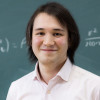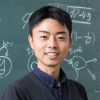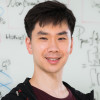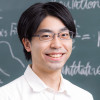今週の注目人物
131 ニュース
-
2022-11-01
今週の注目人物
Self-introduction: Thomas Hitchcock
Hi, I’m Thomas Hitchcock. I grew up in the UK, studying Genetics and Systems Biology at the University of Cambridge, before moving up to the University of St Andrews to do my PhD in Evolutionary Genetics, and have now joined iTHEMS as an SPDR. I’m interested in why organisms appear the way they do, and how we can use evolutionary theory to better understand this. In practice, I’ve study two main flavours of problem, (1) when and why do organisms (and genes) come into conflict with one another, and (2) how are organisms (and genes) expected to weight different fitness trade-offs. To tackle these problems, I use a mix of population genetics and evolutionary game theory, and focus mainly on unusual genetic systems, life histories, and ecologies, which I hope might prove particularly clear tests of theory. I’m excited to discuss and learn from the wide variety of researchers at iTHEMS, and hopefully incorporate some new mathematical tools and frameworks into ecology and evolution.
-
2022-07-04
今週の注目人物
Self-introduction: Christy Kelly
Hi, I'm Christy Kelly. I studied physics for my undergraduate degree in London before moving to Edinburgh to do a PhD in theoretical physics at Heriot-Watt university, completed in early 2022. I have now joined iTHEMS as an SPDR. I am interested in gravity, especially coarse aspects of gravity that persist in the absence of differentiable structure; in more physical terms, we can perhaps think of this as gravity in regimes where quantum fluctuations become significant. In such regimes, basic mathematical tools such as calculus are no longer valid and it becomes nontrivial how to characterise even such fundamental notions as curvature. To get around this problem, I hope to exploit the recently flourishing mathematical field of optimal transport theory, which has already become a paradigm for the study of low regularity Riemannian geometry and has seen some very exciting recent developments in the Lorentzian case. Unexpected connections to different fields of physics also arise naturally in the optimal transport theoretic framework: for instance, the Einstein equations can be characterised in terms of the convexity/concavity properties of certain entropy functionals along choice trajectories in spacetime. Optimal transport theory also provides a notion of curvature for networks which has proved of some structural significance; I hope to also take this line of research forward during my time here at iTHEMS.
-
2022-06-09
今週の注目人物
Self-introduction: Akira Matsumoto
I am Akira Matsumoto. I was in KEK until March 2022 as a student of SOKENDAI and got my Ph.D. there. Then I came to RIKEN and joined iTHEMS as a postdoctoral researcher in May 2022. I am interested in non-perturbative nature of gauge theories such as quantum chromodynamics (QCD), which describes the dynamics of quarks and gluons. Since these elementary particles are building blocks of matter, QCD is the important key to understanding history of our universe. The most powerful method of studying QCD is the Monte Carlo simulation based on the lattice gauge theory. So, we can simulate the dynamics of QCD on a supercomputer. However, in some cases, the Monte Carlo method is not applicable due to the so-called sign problem. For example, QCD with the chemical potential or with the topological theta term suffer from this problem. Since they are related to the structure of neutron star and the strong CP problem, the sign problem is a major obstacle to understanding such phenomena. I am studying and developing methods to avoid this problem. There are some conventional approaches such as the complex Langevin method and the tensor renormalization group. I am also trying to apply recently developing quantum computation to the simulation of gauge theories. I expect we can overcome the sign problem by using these methods in near future.
-
2022-04-20
今週の注目人物
Self-introduction: José Said Gutiérrez-Ortega
¡Hola! This is José (ホセ). I am a Mexican biologist in search of knowledge and interactions with scientists in all disciplines. I obtained my bachelor's degree in Mexico and completed my graduate studies in Japan: two countries where I grew up as a researcher, and where I also had great experiences working in science education. I joined iTHEMS as a SPDR in April 2022, and this transition represented an extraordinary chance for me to expand my research lines and interests. My scientific background is in evolutionary biology and ecology. Therefore, the main questions that motivate my studies are “how is the origin of the species?”, “why are species the way they are?”, “why do species change over time?”, “how do species interact with the environment and other species?”. To answer that kind of questions, I have gained abilities in phylogenetics, phylogeography, population genetics, plant systematics, botany, taxonomy, and population ecology. If these prior skills are useful for your research, or if you want to start something completely new, I am always available to work together with you. よろしくおねがいします!
-
2022-04-18
今週の注目人物
Self-introduction: Yuto Moriwaki
Quantum field theory is a physical theory that describes a wide range of phenomena from the subatomic world to the cosmic scale, and can be regarded as a fruit of human wisdom. However, quantum field theory has not yet been mathematically formulated. This problem perhaps asks us, "How do we formulate space?" According to the philosophy of algebraic geometry, "space and algebra" are almost the same thing. Here, the algebra is a collection of functions (classical fields). So let us consider the algebra consisting of quantum fields. The "classical algebra" is associative, whereas the "quantum algebra" is non-associative. What should be the corresponding space? I am currently studying this algebra of quantum fields in the case of two-dimensional quantum field theory. In my previous research, I have worked mathematically on (1) a formulation of the algebra of two-dimensional conformal field theory, (2) constructions of examples, and (3) a construction of non-perturbative deformations. More recently, I have returned to the question of "space" a bit, studying the axioms (consistency) of quantum field theory from a viewpoint of an operad structure of moduli spaces and higher categories. I was originally a pure mathematician studying representation theory. Crossing the field into physics has been fruitful for my life, although there is still a lot I don't understand. I am very happy to be here at iTHEMS and hope to have good interactions and co-evolution with many researchers.
-
2022-04-15
今週の注目人物
Self-introduction: Shou Yoshikawa
My name is Shou Yoshikawa. I joined RIKEN iTHEMS as an SPDR in April 2022. I am a mathematician studying algebraic geometry. I am interested in an analog of the existence of Kähler-Einstein metric to positive characteristic. Algebraic geometry in positive characteristic is a purely mathematical subject, however, the Einstein metric is deeply related to Physics. I hope that we find a new relation between mathematics and other sciences studying such analogies.
-
2022-04-15
今週の注目人物
Self-introduction: Daiki Kumakura
My name is Daiki Kumakura. I joined iTHEMS as JRA (Junior Research Associate) in April 2022. My research fields are microbial evolutionary ecology and mathematical biology. Still undergraduate, I researched the metabolism of deep marine microbes with transcriptome analysis and comparative genome analysis. Because I am interested in the evolutionary process of microbes with the ecological interactions, I currently have researched the coevolution of microbes with theoretical analysis. Then, I do interdisciplinary research of fieldwork and theoretical simulation. The main field is a hot spring (Japanese is an onsen). I sample the sediments and water at each location and do bioinformatics. In the theoretical analysis, I construct mathematical modeling and simulation. I have the unique experience of discussing with theoretical researchers in various fields at iTHEMS. Through this interdisciplinary research and discussion, I hope to make my doctoral course meaningful.
-
2022-04-15
今週の注目人物
Self-introduction: Taketo Sano
My name is Taketo Sano. I joined iTHEMS as a special postdoctoral researcher in April 2022 after I got the Ph.D. in mathematical sciences from the University of Tokyo. My research area is in low-dimensional topology and knot theory. I am interested in the intersection of (or interaction between) topology and combinatorics. Spaces are inherently infinite and beyond direct computations, while their algebraic images (under some nice mappings) are usually more tractable, and in some cases algorithmically computable. When one finds nice properties in the algebraic level, it is natural to expect that they are reflections of some hidden structures in the spacial level. My aim is to investigate the nature of the unseeable spaces through their algebraic images, by using theoretical tools (from algebraic topology, homotopy theory and category theory) together with computer powers.
-
2022-04-07
今週の注目人物Self-introduction: Makiko Nio
She has been involved in precision calculations of Quantum Electrodynamic(QED), such as energy spectra of simple hydrogen-like atoms and the anomalous magnetic moments of the electron and the muon. The results of the calculations are used to determine the value of the fine-structure constant that governs any electro-magnetic phenomena. The QED results are also essential to test the Standard Model(SM) of elementary particles and to find something new beyond the SM by comparing theoretical predictions to measurements.
-
2022-04-06
今週の注目人物
Self-introduction: Tomoya Naito
My name is Tomoya Naito. I joined RIKEN iTHEMS as an SPDR in April 2022, while I have participated in many activities in iTHEMS including the iTHEMS-phys study group and the iTHEMS math-phys working group so, probably, some of you have known me. My research topics are related to computational quantum many-body problems, especially density functional theory (DFT). In principle, one can obtain all the properties of quantum many-body problems by solving the many-body Schrödinger or Dirac equation; however, it is, in practice, difficult to solve it. DFT, developed by Hohenberg, Kohn, and Sham, is one of the efficient methods to solve such problems. DFT has been applied to the study of atomic nuclei, atoms, molecules, and solids for decades, while there are still many fundamental things to be solved or understood. My research topics are briefly divided into two parts: fundamental studies of the DFT and studies of quantum many-body problems (atomic nuclei, atoms, molecules, and solids) using DFT. Recently, I have started an astrophysical study using knowledge of nuclear physics and a study of the mathematical aspect of DFT in collaboration with iTHEMS (previous or current) members. I look forward to extending collaborations with iTHEMS colleagues!
-
2022-04-06
今週の注目人物
Self-introduction: Jizhou Li
My name is Jizhou (G-Joe) Li. Born and raised in Beijing, got my PhD from the Washington State University, I’m now thrilled to join the RIKEN iTHEMS team as a postdoc researcher. A theoretical physicist by training, I have worked on nonlinear dynamical systems and quantum chaos during my PhD and postdoc years. After joining the RIKEN in April 2022, I will embark on a new journey in the field of computational virophysics to study the dissemination of viruses in various circumstances, as well as the interactions between the viruses and the hosts environments. Looking forward to expand my spectrum and learn from collaborators in different fields.
-
2022-04-06
今週の注目人物
Self-introduction: Keiichi Morita
My name is Keiichi Morita, and I joined iTHEMS in April 2022 as a junior research associate / student trainee. I am now involved in a Ph.D. program at the SOKENDAI University. The main question of my research is how adaptive evolution can determine species coexistence and structures of ecological communities. I focus on rapid adaptation which can change the strength and directions of species interactions and finally affect population dynamics. I hope to understand how the evolution of an individual phenotype can affect species coexistence by formulating transient processes and finding conditions of coexistence from analysing and simulating my mathematical models. I consider analyzing experimental data and demonstrating my mathematical models. My final goal is to discover a general rule in ecology. I am looking forward to interacting with other members working with various interests in iTHEMS and finding a new direction of research out of it.
-
2022-04-01
今週の注目人物
Self-introduction: Yan Lyu
I am a Ph. D candidate in Peking University, China, and I joined iTHEMS on April 1st 2022 as a student trainee. I am interested in understanding the interactions between hadrons from the fundamental theory, i.e., quantum chromodynamics (QCD). It is in some sense similar with determining the Coulomb interaction between two objects by calculating a simple integral using a pen and a piece of paper, like high-school students usually do in their physical class. However, as far as QCD is concerned, such an integral is too complicated to be done by using a pen and a piece of paper, thus I employ the so-called lattice QCD method to calculate such an integral by supercomputers. Once the interactions are determined from QCD, one can use them to various systems from nuclei to neutron star. I am very happy to join iTHEMS, and I look forward to interacting with people from various fields.
-
2022-04-01
今週の注目人物
Self-introduction: Kotaro Murakami
My name is Kotaro Murakami and have joined iTHEMS since April 2022 as a student trainee. My research is to solve the mystery of hadrons from the first-principle calculation of quantum chromodynamics (QCD). QCD is a theory describing the dynamics of quarks and gluons, and hadrons are composed of these particles. There are several hadrons we do not know how are created from quarks and gluons, which are called exotic hadrons. My ultimate goal is to identify all of the hadrons including exotic hadrons from QCD. I am working on the lattice QCD studies of baryon resonances from meson-baryon scatterings. I hope to have fruitful discussions in iTHEMS with not only people in particle physics or hadron physics but people in other fields.
-
2022-04-01
今週の注目人物
Self-introduction: Xun Liu
My name is Xun Liu, and I joined iTHEMS in April 2022 as a student trainee. I am now involved in a PhD program at the University of Tokyo. My current research project and interest mainly lies in the field of two-dimensional conformal field theory, string theory, and string field theory. I am also interested in the relationship of these fields with formal mathematical topics, including group and representation theory, and analytical geometry. I am looking forward to interacting with mathematicians to form a more mathematical well-developed language in describing CFT and string theory.
-
2022-03-02
今週の注目人物
Self-introduction: Masato Itami
My name is Masato Itami, and I have joined iTHEMS as a visiting scientist in March 2022. I love stochastic things by nature, so I am currently studying the universal form of stochastic equations of motion for fluctuating objects in non-equilibrium systems. I am looking forward to interacting with people from various fields. By the way, my hobby is chess, so if you like chess, let's play chess together while/without talking about science.
-
2021-11-29
今週の注目人物
Self-introduction: Tomoki Nosaka
My name is Tomoki Nosaka. I have joined RIKEN iTHEMS as a research part-time worker in November 2021. My research field is the theoretical physics. I have been trying to reveal new aspects of M-theory, which is supposed to be the theory of everything though still being mysterious, by means of the supersymmetric gauge theories, matrix models and their integrability. Recently I am also interested in the quantum information theory and the various notions of chaos in quantum many-body systems which are found to be closely related to the black hole physics. I am looking forward to interacting with people in iTHEMS working with various research interests and finding a new direction of research out of it.
-
2021-10-13
今週の注目人物
Self-introduction: Gilberto Nakamura
My name is Gilberto Nakamura and I joined iTHEMS as a postdoctoral researcher in Oct 2021, after working as a postdoctoral fellow at IJCLab/CNRS in France. I'm interested on the role of noise and correlations in biologically inspired systems. The relation between fluctuations and correlations lies at the heart of the theory of critical phenomena, with ramifications in Statistical Physics and Quantum Field Theory. Fluctuations in biological systems are further exacerbated by the innate variability of organisms, adding richness to the dynamics and promoting the emergence of complex behavior. More recently, I have worked on disease-spreading dynamics, viral infections, and migration of cancer cells, all of which have a significant impact on human health and require continued interdisciplinary efforts across Mathematics, Physics, and Biology. My current focus has been on bottom-up approaches, starting from microscopic stochastic models and working them out into the hydrodynamic limit, with support from numerical Monte Carlo simulations, followed by parameter extraction from data. I am sure the interdisciplinary environment fostered by iTHEMS will promote new collaborations and further advance my research goals.
-
2021-10-04
今週の注目人物
Self-introduction: Yixin Guo
My name is Yixin GUO, a Junior Research Associate joined in iTHEMS from October 2021. I come from China, and now study in the Doctoral Course at The University of Tokyo. I am majoring in theoretical nuclear physics. I am mainly interested in (but not only) the quantum many-body problem, nuclear structure theory, density functional theory, and nuclear reaction theory. I also have some experience in the accelerator physics. I look forward to exchanging ideas with various researchers from different fields.
-
2021-09-08
今週の注目人物
Self-introduction: Matthias Berwein
My name is Matthias Berwein and I'm from Germany. I did my undergraduate studies in physics at TU Munich from 2006 to 2011, followed by a PhD 2012-2016 also at TU Munich in the group of Nora Brambilla. Then I came to Japan for my first postdoc at Tohoku University in Sendai under a JSPS fellowship with Yukinari Sumino. Since 2018 I've been at RIKEN, first in the SPDR program at Quantum Hadron Physics Lab, and from 2021 in iTHEMS. The focus of my research lies in theoretical studies of the strong interactions through the theory of quantum chromodynamics and with a special emphasis on heavy quarks. I have worked on several projects on the static quark potential, heavy quarkonium hybrids, and heavy quarks at finite temperature, using perturbative calculations and effective theory methods. Currently, I'm studying properties of the energy-momentum tensor in these environments. I look forward to many fruitful interactions with fellow researchers here at iTHEMS.
-
2021-08-05
今週の注目人物
Self-introduction: Congcong Le
My name is Congcong Le from China, and I join iTHEMS on August 1st 2021 as a Postdoctoral Researcher. After graduation, I came to the Institute of Physics, Chinese Academy of Sciences to study theoretical physics, and obtained my PhD in July 2017. My research focuses on the theoretical study in condensed matter systems, including unconventional superconductivity, strongly correlated system, and novel topological system (topological insulators, Dirac semimetal, Weyl semimetal), and I start to be interested in twisted bilayers and topological phases in the non-Hermitian systems. I have enjoyed using mathematics to explore condensed matter physics and working with theorists and experimenters. In my spare time, I like Chinese chess, badminton, table tennis and climbing.
-
2021-07-20
今週の注目人物
Self-introduction: Yalong Cao
I am a mathematician doing research on algebraic geometry, differential geometry and mathematical physics. I am particularly interested in understanding Yang-Mills theory on Calabi-Yau 4-folds and how it is interacted with enumerative geometry. I am eager to understand how such theory could lead to unexpected relations with other areas. It is my great pleasure to join RIKEN iTHEMS and I am looking forward to having exciting discussions with you.
-
2021-07-02
今週の注目人物
Self-introduction: Etsuko Itou
I'm Etsuko Itou, a Postdoctoral Researcher (Concurrent) since July 2021. I'm interested in quantum field theories, in particular, quantum chromodynamics (QCD) in extreme regimes. Although QCD in the superfluid phase, which occurs in low-temperature and high-density regimes, is still an unsolved area due to the infamous sign problem, a theoretical understanding is urgently needed in relation to neutron star physics. I am working on various numerical approaches to understanding quantum field theories with the sign problem. For example, I utilize the conventional classical supercomputers to study qualitative properties of modified QCD without the sign problem, and I develop quantum computation algorithms based on a new formula where the sign problem does not emerge.
-
2021-06-11
今週の注目人物
Self-introduction: Yantao Wu
My name is Yantao Wu. I joined iTHEMS in June 2021. My research field is in computational and theoretical statistical physics. I'm also interested in quantum computing. I obtained my PhD in physics from Princeton University in May 2021. During graduate school, I have worked on renormalization group of quantum and classical statistical systems in the context of Monte Carlo simulations. I'm also quite familiar with path-integral molecular dynamics. Currently, I'm interested in developing tensor network algorithms for quantum dynamics in one dimension and ground state calculations in two dimensions. In particular, I'm interested in the approximate canonical form of 2D tensor networks, and its associated entanglement structure. I'm also interested in issues related to quantum dynamics, such as entanglement evolution and eigenstate thermalization hypothesis at the edge of the energy spectrum. I'm based in UC Berkeley, and would be glad to host any iTHEMS visitors in the bay area. Based in UC Berkeley, I have recently got interested in the hardware of quantum computing as well. I hope that we can one day see the ENIAC of our generation. In my spare time, I like soccer, climbing, poetry, and Go (not very good though).
-
2021-05-28
今週の注目人物
Self-introduction: Ryo Namba
Pursuit of the fundamental law that governs the evolution of our universe, is the end goal of cosmology. Our universe is known to be expanding. It is not only expanding, but has been, and perhaps will be, expanding. The driving force of the current accelerated expansion, often called dark energy, is still beyond our understanding, despite that the fate of the universe entirely depends on the nature of dark energy. Furthermore, cosmological observations provide indications that an accelerated expansion also took place at the earliest stage of our universe, known as inflation, and that the seeds of all the structures we observe today were encoded during this period. Thus the physics in the inflationary era is of essential importance, fixing the initial conditions of our universe. The forthcoming advancement of multi-messenger (photons, neutrinos, and gravitational wave), multi-frequency observations opens up the possibility of probing such cosmological signals in novel manners. My research focus is encapsulated in the studies of interactions at cosmological scales, ranging from the highest-energy processes at the onset of the universe to the laws of gravity at the largest distances, by making use of the knowledge of quantum field theory, elementary particle physics and gravitational theory as technical tools. Interactions in cosmology are inevitably those in a gravitating system, and they reserve a large domain of unresolved mysteries that provide a fascinating ground to explore. Understanding the physics in both ends of these extremes is necessary to reveal the origin and fate of our universe. Many different branches of physics are involved in this research adventure, and extending the border of scientific disciplines is of essential importance. [Brief academic history] I received my Ph.D. from the University of Minnesota (USA), and continued my research activities as a postdoctoral researcher at Kavli IPMU (Japan), McGill University (Canada), and Tsung-Dao Lee Institute (China), before joining RIKEN iTHEMS in May 2021. I have worked on research projects on particle production in the early universe, thermalization process (reheating), modified gravity theories (scalar-vector-tensor theories, massive/bimetric gravity), etc.
-
2021-05-21
今週の注目人物
Self-introduction: Akira Harada
I'm Akira Harada, a RIKEN SPDR since April 2021. I'm interested in astrophysics, especially supernovae. The core-collapse supernova (CCSN) is the explosive death of a massive star. Because of the extreme environment realized at the center of the CCSN, the explosion mechanism involves a vast field of physics, namely hydrodynamics, nuclear physics, neutrino physics, and gravitational physics. Besides, understanding such a complicated phenomenon requires numerical simulations. I'm trying to reveal the mechanism by exploiting all these pieces of knowledge. I'd like to get stimulated from interdisciplinary conversations with iTHEMS people.
-
2021-05-17
今週の注目人物
Self-introduction: Naritaka Oshita
I am a theoretical physicist who works on gravity, cosmology, and quantum field theory. Quantum fluctuations of mater/gravitational fields in an expanding universe or a black hole exhibit thermal radiation and superradiance. These phenomena are important to understand the thermal nature of the gravitational systems and how information of matter is encoded there. Also, the classical linear perturbations of a black hole are characterized by the quasinormal modes of the black hole. This is useful to test classical/quantum gravity theories by the observation of gravitational waves. Beyond the linear perturbation in gravitational systems, I am also working on non-perturbative phenomena of quantum fields such as vacuum decay in strong gravity. The standard model of particle physics predicts that the Higgs field is metastable, which means that our Universe might eventually undergo a catastrophic vacuum decay and be filled with negative vacuum energy. The vacuum decay process is therefore important to understand the history and fate of the Universe.
-
2021-05-13
今週の注目人物
Self-introduction: Eiji Inoue
I'm Eiji INOUE, a new member of iTHEMS as a special postdoctoral researcher in mathematics. My current interest is Kahler geometry of algebraic variety. Algebraic variety is (locally) the solution set of polynomials, say x^2 + y^2 -1 = 0. While its origins trace back to ancient Greek, it still fascinates many mathematicians: you can find many Fields medalists, including all Japanese medalists, are awarded for their monumental works on algebraic variety. Calabi-Yau variety is a special class of algebraic varieties attracting attention in string theory. A Calabi-Yau variety admits a Kahler-Einstein metric, which can be thought of as a canonical 'shape' of the variety. Though a general variety in other classes does not necessarily admit such canonical metrics, it is gradually believed by not a few specialists that any variety has a unique degeneration to another variety admitting a canonical metric in some sense. My recent study gives a mathematical formulation of this problem. This framework has a special aspect: it naturally possesses a new parameter λ which plays a role analogous to the inverse temperature. When λ is sufficiently low, canonical metrics, which you may see as 'equilibrium states' of the variety, are unique if it exists. On the other hand, when λ is sufficiently high, canonical metrics are not unique and the absolutely stable states may break the symmetry of the variety. It is reminiscent of phase transition. I am looking forward to discussing this phenomenon with researchers in other areas.
-
2021-05-12
今週の注目人物
Self-introduction: Kazuki Kannaka
I’m Kazuki KANNAKA, a special postdoctoral researcher (mathematician) in iTHEMS. I am interested in the global properties of locally homogeneous manifolds, especially those with Lorentzian structures (e.g., anti-de Sitter manifolds) which are used as models of spacetimes. I am currently studying the spectral theory of the hyperbolic Laplacian (the Klein-Gordon operator), which is a differential operator defined “intrinsically” on such manifolds. In iTHEMS, I would like to find interactions with other various research areas.
-
2021-05-11
今週の注目人物
Self-introduction: Michiya Mori
I am Michiya Mori, a new member of iTHEMS as a Special Postdoctoral Researcher. I received my Ph.D. at The University of Tokyo in March 2021. I am working on the mathematical theory of operator algebras. I am interested in examining certain structure of a collection of linear operators acting on a Hilbert space. In particular, I have studied the metric structure and the (lattice) order structure of, e.g., a domain of bounded self-adjoint operators, the collection of self-adjoint projections, the unit sphere. My research is often base on the classical study by, for example, von Neumann, Wigner, Loewner and Kadison, rather than modern operator algebraists. I believe that my research is closely tied with various fields of theoretical sciences. I hope to develop my research in an interdisciplinary direction.
-
2021-05-11
今週の注目人物
Self-introduction: Mizuki Oikawa
I am Mizuki Oikawa, a Junior Research Associate (JRA) student who joined iTHEMS in April 2021. I am interested in the mathematics of two-dimensional conformal field theory, such as vertex operator algebras, conformal nets, and Segal conformal field theories. In particular, my interest includes moonshine phenomena, which connect finite groups and modular forms via conformal field theories. I look forward to interacting with iTHEMS members in different research areas.
-
2021-05-10
今週の注目人物
Self-introduction: Hidetoshi Taya
My name is Hidetoshi Taya. After finishing my Ph. D in The University of Tokyo in 2017, I had several postdoctoral positions at iTHEMS RIKEN (2017-18), Fudan University (2018-20), and Keio University (2020-21) and then come back to iTHEMS, RIKEN from April, 2021 as a special postdoctoral researcher. I am a theoretical physicist working on (but not limited to) particle and nuclear physics. In particular, I am interested in non-perturbative and non-equilibrium phenomena driven by strong fields, and studying their application to, for example, heavy-ion collisions, intense lasers, and condensed-matter systems. I am also interested in application of mathematical methods such as the resurgence theory and the exact WKB method. I look forward to interacting with iTHEMS members and to enjoying something new/interesting together.
-
2021-05-10
今週の注目人物
Self-introduction: Yuya Kusuki
I am Yuya Kusuki. I joined iTHEMS in April 2021. I am studying the theoretical particle physics. My particular interest is conformal field theory in the context of the AdS/CFT. For example, I would like to understand “Which spectrum and which coupling constants are required to reproduce the semiclassical gravity?”, “Whether or not does a pure gravity on AdS exist?”, “What is the precise definition of the quantum chaos in AdS/CFT?” and so on. For this purpose, I mainly utilize (i) some information tools, developed in the interface between quantum gravity and quantum information, and (ii) conformal bootstrap equation. I am looking forward to collaborating with researchers in various fields at iTHEMS. Since my research is based on gravity, conformal field theory, information theory, condensed matter, that is, many topics, I believe such a cross-disciplinary collaboration provides wonderful results.
-
2021-03-04
今週の注目人物
Self-introduction: Yuta Sekino
I am Yuta Sekino, a JSPS fellow who joined iTHEMS on March 1, 2021. I am a theoretical physicist studying physics of ultracold atoms. My main research interest is universal properties of many-body systems as well as transport phenomena. I am currently working on atomic gases in spatially one dimension and spin transport. At iTHEMS, I hope to broaden my research horizon through discussions with researchers in various fields.
-
2021-03-04
今週の注目人物
Self-introduction: Takeru Yokota
My name is Takeru Yokota. I joined iTHEMS in March 2021. My research field is theoretical physics. I have been interested in the development of nonperturbative frameworks to describe many-body systems, such as the functional renormalization group (FRG). In particular, I have challenged to establish a new framework based on the combination of FRG and density functional theory, which is another powerful method used for various systems including nuclear systems and condensed matter systems, and involved in the application to electrons, nucleons, and classical liquids. I am looking forward to new developments of research emerged from the interaction with researchers from various fields in iTHEMS.
-
2021-02-04
今週の注目人物
Self-introduction: Björn Ahlgren
My name is Björn Ahlgren. I joined iTHEMS as a visiting scientist in February 2021 as part of my current postdok, and I'm otherwise based at KTH in Stockholm, Sweden. My field of research is astrophysics, where I work mainly on gamma-ray bursts (GRBs), which are some of the most violent explosions in the Universe. These phenomena are caused by the collapse of particularly massive stars, and by compact object binary mergers, and they can serve both as laboratories for physics under extreme conditions, as well as probes of the early Universe. In my research I focus on the intersection between theory and observations, where I try to develop and reconcile theoretical models for the emission mechanisms of GRBs with the best available observations, using statistical methods. My specialisation lying in applied statistics, I really enjoy interdisciplinary projects where I get to work with new ideas and new data. I'm excited to join iTHEMS and I hope I will get the opportunity to engage in new collaborations across different disciplines.
-
2020-11-05
今週の注目人物
Self-introduction: Tianfeng Hou
My name is Tianfeng Hou and I joined iTHEMS in November 2020. I am originally from a city in the east of China. After I finished my undergraduate study, I moved to the Netherlands (Leiden University) to study applied mathematics. And after that I moved to Belgium (KU Leuven) to continue with my PhD career. Recently, I finished my PhD with a title ’Efficient Probabilistic Assessment of Hygrothermal Performance: sequential Monte Carlo and decomposition methods’. Particularly, two tasks are included in this research. First, a faster surrogate model is developed in order to replace the current time-consuming building simulation models. Second, an efficient sampling strategy that can minimize the needed simulations in the framework of Monte Carlo based probabilistic analysis is set up. All in all, I think mathematics is fun, and I am very enthusiastic about the use of mathematics to solve different engineering problems. During my stay in iTHEMS I hope I can have the opportunity to cooperate with researchers from different disciplines and explore more about the beauty of mathematics.
-
2020-10-06
今週の注目人物
Self-introduction: Maria Giovanna Dainotti
I am originally from a city in South of Italy. After my PhD at the University of Rome La Sapienza in 2008 I moved to Jagiellonian University in 2009 as a research assistant and I have been Visiting Scholar in several places all around the globe. I here mention a few: I was already at RIKEN with the JSPS Fellowship in November 2014-January 2015 in the ABBL group under the direction of Nagataki-san and as a visiting researcher in January and February 2019. I was in US at Stanford University with the Fulbright, Marie Curie’ and the American Astronomical Society Fellowship from 2012-2013, and 2015-2018. In all these years I have been studying Gamma-Ray Bursts, selection biases in treating GRB correlations, their application as cosmological tools and as a tool to discriminate among theoretical physical models. More recently I have started working on machine learning for redshift extraction of GRBs and Active Galactic Nuclei and on the selection effects in SNe cosmology in collaboration with Hatsuda-san and Nagataki-san. Last year I started collaborating with Don Warren and Gilles Ferrand to a project that aims to include virtual reality to show GRBs correlations to a broader audience.
-
2020-10-01
今週の注目人物
Self-introduction: Ken Furukawa
I am Ken Furukawa. My research area is the mathematical theory of partial differential equations related to the fluid dynamics and diffusion phenomena. More specifically, we studied mathematically rigorous justification of the derivation of the primitive equations by the Navier-Stokes equations. The primitive equations have nice properties on well-posedness and have a strong connection with the Navier-Stokes equations. We obtained some results on the well-posedness of the Navier-Stokes equations in this research. Recently, I have been interested in the mathematical aspect of data assimilation. Data assimilation is very useful to obtain a plausible forecast and is also closely related to our lives. However, mathematically rigorous studies of data assimilation from the mathematical theory of PDE are under development. I will study data assimilation from the view PDE point of view.
-
2020-09-25
今週の注目人物
Self-introduction: Catherine Beauchemin
Bonjour! I was already a member of iTHEMS as a Senior Visiting Scientist so probably you already know me. But since September 2020, I became a Deputy Program Director of iTHEMS. I was looking forward to spending more time at RIKEN, working more closely with everyone, but unfortunately, with COVID-19, for now I have to stay in Toronto. As you maybe know, I am a professor of physics, but my research is in the field of virophysics (ヴイルス物理学). I apply the techniques of physics to virology. More generally, I like applying the methods of physics and computational methods to fields where theoretical/quantitative analysis is less common, like biology and health research, or even ergonomics! I think the methodologies developed in physics can translate to many other fields and provide new insights. Most of my work involves/requires direct collaborations with experimental virologists. I also really enjoy convincing other physicists and mathematicians to join in solving these types of problems across disciplines. For me, iTHEMS is an ideal environment to develop such collaborative projects. In my new role as Deputy Program Director, I want to do my best to help support the young researchers in iTHEMS, and make sure they have everything they need to succeed at their goals. I want to help foster new collaborations, through which everyone can learn new skills, or get help to bring their research to the next level. I have a few ideas that I want to share with all of you over time. If you have some thoughts or concerns, or if you want to discuss something with me, please send me an email anytime. I am happy to get to know you better.
-
2020-08-03
今週の注目人物
Self-introduction: Ching-Kai Chiu
Hello, I will officially join iTHEMS on August 1st as a senior research scientist. My name is Ching-Kai Chiu from Taiwan, and I am a condensed matter physicist. Unfortunately, I cannot enter Japan now due to the travel restriction. Hopefully, I can see everyone in person after COVID-19. Please feel to contact me anytime. My research interests are topological states of matter, superconductivity, and quantum computing. Specifically, my works are related to topological insulators, semimetals, superconductors, and non-Hermitian systems, as well as the designing of universal quantum computers. I have enjoyed using mathematics to explore condensed matter physics and collaborating with theorists and experimentalists. However, I don’t want to limit myself in condensed matter physics. I have broad interests in science. When I was in graduate school (the University of Illinois at Urbana-Champaign), I learned general relativity (Sean Caroll’s and Wheeler’s books) and field theory. Recently, I am also interested in (quantum) cryptography and cryptocurrency. It is exciting for me to work in iTHEMS to interact with scientists from different fields. About my personal life, I lived in many countries, such as USA, Canada, Taiwan, Germany, China. I have enjoyed nature and visited around 20 national parks in the United States. You name it. Yellowstone, Yosemite, and Mount Rainier. My wife and I like to travel. We have been at least 25 countries before COVID-19. My favorite habits are rock climbing and playing board games, such as Terraforming Mars and Power Grids.
-
2020-04-14
今週の注目人物
Self-introduction: Kengo Kikuchi
I’m Kengo Kikuchi, a special postdoctoral researcher in iTHEMS. I’m studying the theoretical physics, elementally particle physics and quantum field theory, especially, gradient flow equation. I’d like to take the opportunity working in iTHEMS to broaden research fields, and it would lead to the new interaction with various study regions.
-
2020-04-13
今週の注目人物
Self-introduction: Naomi Tsuji
I am Naomi Tsuji, a postdoctoral researcher at RIKEN/iTHEMS. My major is observational studies of high energy astrophysical phenomena. I have been working on particle acceleration and nonthermal radiation in shock waves of supernova remnants by using X-ray observations. I also analyze TeV gamma-ray data, as a member of H.E.S.S. (High Energy Spectroscopic System) collaboration.
-
2020-04-13
今週の注目人物
Self-introduction: Hui Tong
My name is Hui Tong, a PhD student from School of Physics, Peking University. My main research topic is nuclear theory, including the interactions between nucleons and using the ab-initio nuclear many-body theory to study nuclear matter and neutron star. Now I am studying on how to extract hadron interactions from lattice QCD calculations. In the iTHEMS, I hope to learn more about theoretical, mathematical and computational sciences, this will be a great opportunity to broaden my horizons.
-
2020-04-09
今週の注目人物
Self-introduction: Yukimi Goto
I am Yukimi Goto, a special postdoctoral researcher of iTHEMS. I have been interested in the mathematical study of physical models. For example, I have investigated the following question in my research: How many electrons can an atom bind? This is a fascinating open problem in mathematical physics. Intuitively, this question is related to the size of the system, e.g., the question: Why are the radii of atoms more or less independent of their nuclear charge? Although one might think these are simple consequences of electrostatics alone, the Pauli exclusion principle plays an essential role. My hope is to understand physics. However, to be honest, I’m not a physicist but an applied mathematician. So, I’m happy if you tell me physics.
-
2020-04-09
今週の注目人物
Self-introduction: Euki Yazaki
My name is Euki Yazaki and I joined iTHEMS in April 2020. My research area is biology, and I have been studying evolutionary biology consistently since I started my research career as a student at University of Tsukuba in 2010. I am particularly interested in the molecular phylogeny and molecular evolution of eukaryotic microorganisms (called Protists). Based on large-scale molecular sequence data acquired from many Protists, I have inferred the evolutionary history of genes and phylogenetic relationships of organisms. Ultimately, I hope to elucidate the early evolution of eukaryotes. I'm very excited to be a member of iTHEMS because the mathematical professionals from diverse backgrounds at iTHEMS give me the opportunity to expand my biology and therefore my science.
-
2020-04-06
今週の注目人物
Self-introduction: Akira Dohi
Hello, I am Akira Dohi, the Junior Research Associate (JRA) student. My research interest concentrates on how neutron stars are cooled or heated. A Neutron star is born as a remnant by supernova explosion of a massive star and basically cools down by many neutrino losses. How to cool or heat the neutron star is connected to the temperature or magnetic field of the surface, which can be estimated using the observations of X-ray astronomical satellite. The cooling and heating processes are believed to be caused in a wide range of density regions even with the above nuclear saturation density. I am studying numerical modeling of neutron stars evolution, and combining some observations, I aim to specify the origin of these processes, which would be useful for elucidation of various physics, above all nuclear theory. iTHEMS’s members have different fields from my area and this would broaden our scientific knowledges and views through communications.
-
2020-04-06
今週の注目人物
Self-introduction: Masaki Taniguchi
I am Masaki Taniguchi, a mathematician, who has been working at iTHEMS/RIKEN since April 2020. My interests cover gauge theory, Floer theory and its applications to 3- and 4-dimensional topology. In a mathematical study of gauge theory, we obtain information of 4-manifolds by observing the moduli space of solutions to a certain non-linear partial differential equation for a given 4-manifold. This method enables us to find interesting phenomena of 3- and 4-dimensional topology which are different from that of other dimensions. Currently, I am studying the following topics: 1. gauge theory for a class of non-compact 4-manifolds called 4-manifolds with periodic ends and their applications to existence of codimension-1 embedding of 3-manifolds and positive scalar curvature on spin 4-manifolds, 2. a quantitative formulation of instanton Floer homology and its applications to a study of the homology cobordism group which is related to existence of triangulations of topological manifolds, and 3. a study of 2-dimensional knots in the 4-space using gauge theory. I'm also interested in physical aspects of gauge theory. I'm looking forward to discussing with researchers in various fields at RIKEN.
-
2020-04-06
今週の注目人物
Self-introduction: Ryusuke Hamazaki
My name is Ryusuke Hamazaki. I am a senior research scientist at iTHEMS and also a RIKEN Hakubi leader of a team on nonequilibrium statistical mechanics. So far I have worked on foundation of equilibrium quantum statistical mechanics, namely how isolated quantum many-body systems relax to thermal equilibrium after long time. Extending this framework, I am currently trying to understand laws of nonequilibrium quantum statistical mechanics. Another motivation of mine is to apply the theory to other nonequilibrium science, such as biology or high-energy physics. I am eager to discuss and collaborate with one another to contribute to interdisciplinary fields through universality of statistical mechanics!
-
2020-01-23
今週の注目人物
Self-introduction: Martin Skrodzki
My name is Martin Skrodzki and I was born in Germany. I studied computer science and mathematics from 2008 to 2011 at TU Dortmund University in Germany where I obtained two Bachelor's degrees. Afterwards, I spend two terms on a Fulbright travel grant at the Texas A&M International University in Laredo, Texas, USA continuing with graduate studies in mathematics. I finishes these with a Master's degree at Freie Universität Berlin, Germany in 2014. My focus in the coursework and in my Master's thesis was on discrete geometry and discrete mathematics. In early 2015, I started work on my PhD with Prof. Polthier at Freie Universität Berlin in the group "Mathematical Geometry Processing". My thesis, titled "Neighborhood Data Structures, Manifold Properties, and Processing of Point Set Surfaces" covers three topics all centered in the context of point set processing. Please find the thesis via the link shown below. I graduated with the title of "Dr. rer. nat" (doctor of the natural sciences) in July 2019. Immediately after my graduation, I started a first postdoc at the Institute of Computational and Experimental Research in Mathematics (ICERM), Brown University, Providence, RI, USA. The position was part of the topical semester program "Illustrating Mathematics" which was concerned about finding new, exciting visualizations of mathematical structures and objects, see the link shown below for some of the results obtained. My research interests are set between computer science and mathematics. I am currently very interested in visualization of high-dimensional data via dimension-reduction methods. Memberships in the Society of Applied and Industrial Mathematics (SIAM), the Solid Modeling Association (SMA), and Eurographics (EG) form my professional network. Finally, I am also an associate editor of the Journal of Mathematics and the Arts (JMA).
131 ニュース
